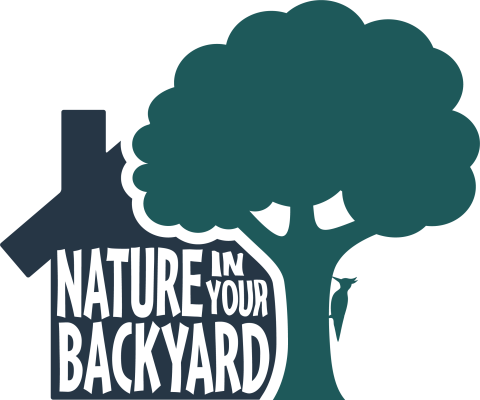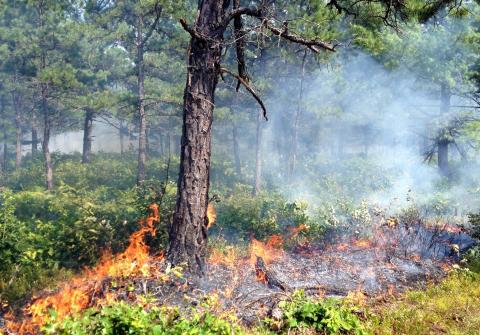About the Nature in Your Backyard Series

Owners of even just a few acres can make a positive difference in their environment through planning and implementing simple stewardship practices learned in The Nature in Your Backyard Series. This series of online webinars and field sessions is designed specifically (but not exclusively) for smaller landowners, with under 20 acres. Woodlots large and small can support wildlife, protect water quality, generate firewood and other forest products, and provide recreation and enjoyment. Whether you are interested in adding some native plants to your yard, enhancing habitat for birds, assessing the health of your trees, cutting trees for firewood, or just learning more about what’s around you, this series can help you become a better steward of your property.
About this Session
Fire has long played a role in shaping New England’s forest, changing species composition and structure, and in turn influencing wildlife habitat. Paradoxically, fire suppression over the past 100+ years, combined with shifts in climate, weather patterns, and past forest management practices, has resulted in increased fuel loads and subsequent risk of wildfires.
In the first half of this session, we’ll delve into historical fire regimes and ecology to learn how fire—and its absence—has shaped our current forested landscape. In the second half, we’ll discuss why wildfire risk is increasing and offer actionable steps you can take to assess and reduce the risk of wildfire around your property and neighborhood while preserving forest and wildlife habitat benefits. Bring your burning questions and leave with a better understanding of the benefits and challenges of wildfire in our forests.

Dr. Jessica Charpentier
Affiliate Faculty, UNH Department of Natural Resources and the Environment
Jess is affiliate forestry faculty at the UNH Department of Natural Resources and the Environment. Her work has in part focused on post-fire stand development and fuel loading to provide managers a better understanding of long-term vegetation and fuel changes in spruce-fir and Northern hardwood forests. Prior to her time in academia, she spent over a decade working in land conservation in New Hampshire, and protecting the northern landscape has been the driving force behind Jess’ work. Her land ethic is deeply rooted in protecting the region’s most important ecosystems while promoting sustainable use of renewable natural resources. Jess holds a PhD in Environmental Studies and a MS in Resource Management & Conservation from Antioch University New England, and a BS in Forestry from Northern Arizona University. She is currently taking some time away from her career to stay home with her very young family.

Lindsay Watkins
Natural Resources Field Specialist, UNH Cooperative Extension
Lindsay is Extension’s Strafford County Forester. While she considers New Hampshire her “chosen home state,” before joining Extension in 2023, she worked as a consulting forester and arborist in the San Juan Islands in Washington, where some of her work focused on wildfire risk reduction. Prior to her detour to the upper left corner of the country, she worked for the Appalachian Mountain Club, the Nature Conservancy, and the US Forest Service. Lindsay has an M.S. from the Field Naturalist Program at the University of Vermont and a B.S. in Natural Resources from Cornell. She is also an ISA Certified Arborist and TCIA Certified Tree Care Safety Professional and considers herself a well-rounded "Professional Tree Nerd."
Register for the Other Nature In Your Backyard Sessions by Clicking the Links Below
Online Sessions are Wednesdays, 12:00-1:30pm. Can't make it to one of the online sessions? Feel free to register and you'll receive a link to a recording and related resources after the workshop.
- March 19: Getting to Know Your Property - view recording here
- March 26: Forest Ecology 101 – Why Trees and Forests Grow Where They Do - view recording here
- April 2: Landscaping to Attract and Support Wildlife - view recording here
- April 9: Identifying Common Trees and Upland Invasive Plants - view recording here
- April 11: Recognizing and Enhancing Wildlife Habitat on Your Land (outdoor field trip - Dover, NH)
- April 16: Buzz and Balance- Rewilding Your Backyard to Support Pollinators While Minimizing Tick Encounters - view recording here
- April 23: Keeping Your Trees and Forests Healthy (online)
- April 25: Choosing and Using the Trees in Your Woods (outdoor field trip - Enfield, NH)
- May 21: Fire in New England's Forests: Historical Context, Ecological Benefits, and Protecting Your Property
